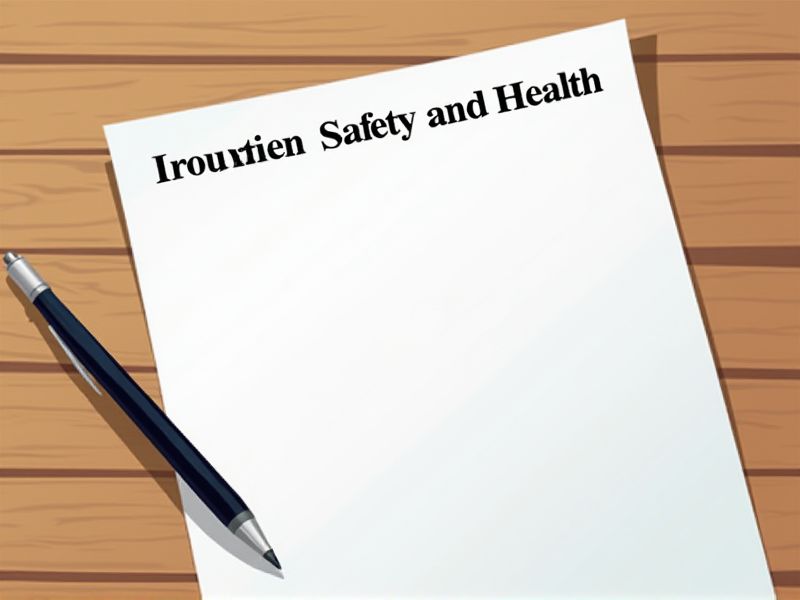
Occupational Safety and Health Specialists are tasked with ensuring workplace safety, compliance with regulations, and minimizing hazards, which necessitates a thorough understanding of various risk factors. Certifications validate this expertise, demonstrating proficiency in critical safety standards. Employers often prefer certified specialists as it mitigates liability and enhances trust in safety protocols. It is vital to recognize some of the key certifications that are essential for an Occupational Safety and Health Specialist.
Certified Safety Professional (CSP)
Holding a Certified Safety Professional (CSP) designation enhances an Occupational Safety and Health Specialist's credibility, reflecting in-depth knowledge and expertise in the field. The certification demonstrates a commitment to maintaining high standards, leading to increased trust from employers and colleagues. With a CSP credential, specialists often access better job opportunities and higher salaries due to their proven competence. Rigorous CSP requirements ensure updated knowledge and skills in evolving safety practices, aligning specialists with current industry standards.
Associate Safety Professional (ASP)
An Associate Safety Professional (ASP) credential enhances credibility and demonstrates a thorough understanding of essential safety principles. Employers often require ASP certification for Occupational Safety and Health Specialists to ensure adherence to industry standards and regulations. Holding an ASP signals a commitment to professional growth and staying updated with best practices in safety management. The credential also potentially opens doors to career advancement and higher responsibility roles within the occupational safety field.
Certified Industrial Hygienist (CIH)
Certified Industrial Hygienists (CIH) bring specialized expertise in identifying and mitigating workplace hazards, which directly enhances the effectiveness of occupational safety strategies. Their certification involves rigorous training in toxicology, exposure assessment, and environmental controls, providing a comprehensive understanding of complex safety issues. With their skills, CIHs can anticipate potential health risks and develop tailored solutions to prevent workplace incidents, thereby minimizing health-related costs for organizations. Employers often benefit from having CIHs on their safety teams, as it can lead to improved regulatory compliance and a reduction in occupational illnesses.
OSHA 30-Hour General Industry Training
Mandatory OSHA 30-Hour General Industry Training equips Occupational Safety and Health Specialists with advanced safety protocols, reducing workplace hazards effectively. This training enhances the specialists' ability to identify and mitigate potential risks, thereby minimizing accidents and injuries. Employers benefit from reduced liability and workers' compensation claims because their workforce is better prepared and informed. Compliance with OSHA guidelines through this training fosters a safer work environment, boosting employee productivity and morale.
OSHA 30-Hour Construction Training
OSHA 30-Hour Construction Training provides Occupational Safety and Health Specialists with comprehensive knowledge of workplace hazards specific to the construction industry. This training enhances their ability to identify and mitigate risks, reducing workplace injuries and fatalities. Understanding OSHA regulations is crucial for specialists to ensure compliance and protect worker health. Improved safety standards lead to a more efficient and productive work environment.
NEBOSH National General Certificate in Occupational Health & Safety
Earning the NEBOSH National General Certificate equips Occupational Safety and Health Specialists with essential knowledge of health and safety management frameworks. Employers often require this certification to ensure that specialists possess a recognized standard of competence and expertise. Workers' safety can be significantly improved by implementing practices and policies grounded in the certificate's teachings. Holding this qualification can enhance an individual's career prospects and provide credibility in the industry.
NEBOSH International General Certificate in Occupational Health & Safety
The NEBOSH International General Certificate equips Occupational Safety and Health Specialists with globally recognized credentials, reinforcing their expertise in managing risks and ensuring workplace safety. Having this certification often results in better job prospects and higher positions within organizations as it demonstrates a comprehensive understanding of key safety principles. Employers tend to prefer candidates with such qualifications because it reflects their commitment to maintaining high health and safety standards. The course content covers essential regulatory frameworks, helping specialists ensure compliance with international safety regulations and reducing the likelihood of work-related incidents.
Certified Environmental Health and Safety Technician (CEHT)
Certified Environmental Health and Safety Technicians (CEHT) help identify and mitigate workplace hazards, reducing the risk of accidents and improving overall safety. By providing expertise in environmental regulations, CEHTs ensure that companies comply with laws, preventing legal repercussions and potential fines. Their knowledge in implementing safety protocols leads to a healthier and more sustainable workplace, reducing illness and absenteeism. Collaborating with Occupational Safety and Health Specialists, CEHTs ensure a comprehensive approach to workplace safety, enhancing operational efficiency and employee morale.
Certified Safety and Health Manager (CSHM)
The need for a Certified Safety and Health Manager (CSHM) arises because they possess specialized knowledge in mitigating workplace risks, which is crucial for safeguarding employee well-being. CSHMs provide a structured approach to safety protocols, leading to reduced workplace accidents and associated costs. Regulatory compliance is a critical aspect of occupational safety, and CSHMs ensure that organizations adhere to relevant laws and standards. Their expertise in risk assessment and management contributes to creating a safer work environment and enhancing organizational productivity.
First Aid/CPR/AED Certification
Occupational Safety and Health Specialists often face emergencies where immediate medical response can prevent injuries from worsening. First Aid/CPR/AED certification equips these professionals with essential skills to stabilize individuals before professional medical help arrives. Certified specialists enhance workplace safety by ensuring the environment is prepared for medical emergencies. Compliance with regulatory bodies and industry standards often necessitates such certifications, ensuring regulatory alignment.
Summary
By obtaining certifications, you can increase job opportunities in occupational safety and health fields. Enhanced skills and knowledge often lead to better job performance and increased workplace safety standards. Certified specialists usually command higher salaries as their expertise is officially recognized. Employers tend to trust certified professionals more, which can lead to career advancement and leadership roles.
